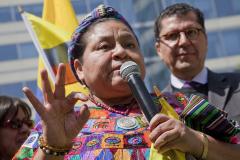As Colombia’s first progressive president, Gustavo Petro, took office in August 2022, he launched an ambitious program called “total peace” to end the nation’s conflict. The program includes negotiating simultaneously with various illegal armed groups remaining after over 13,000 members of the Revolutionary Armed Forces of Colombia (FARC) were successfully demobilized through the 2016 peace accords. The 2016 accords, backed by the U.S. government, helped to end the longest-running conflict in the Western Hemisphere (1964-2016), in which nearly seven million people were internally displaced and over 250,000 people were killed. Despite many setbacks, negotiations with the largest remaining guerrilla group, the National Liberation Army (ELN), have now advanced farther than under any previous Colombian president. Negotiations have proceeded tentatively with a dissident FARC group that refused to demobilize in 2016 and other groups. Most significantly, the Petro administration has increased political will and investment levels in implementing the historic 2016 peace accords. At the same time, many Colombians in areas affected by conflict remain at the mercy of armed groups and have yet to see the realization of the ambitious promises of either the 2016 accords or “total peace.” Attempts by the Petro administration to negotiate with other illegal armed groups deeply involved in organized crime, like the Clan del Golfo, have been more controversial. Civil society groups have raised concerns regarding the improvisational way in which negotiations and poorly-enforced ceasefires with criminal groups have been carried out. Obstacles to peace building include the Petro government’s administrative weaknesses, illegal armed groups’ failure to respect civilian populations even during ceasefires, and opposition to reforms from a divided Colombian Congress. Yet the United Nations’ assessment is positive on balance, noting that “the Government’s engagement [in negotiations] with illegal armed groups and criminal organizations has reduced lethal violence.”1 According to the International Crisis Group, the Petro administration is learning from its mistakes and is applying stricter criteria before agreeing to ceasefires,2 as well as suspending them in response to ceasefire violations. Even with the undoubted political will to achieve peace, the challenges ahead are daunting. Most peace accords fail within five years of signing. While Colombia has passed that benchmark, its partial peace remains fragile. At a moment when global conflict is rising, the United States would be well advised to support the few bright spots, including Colombia, where peace is advancing. Continued strong U.S. support for implementation of the 2016 accords and more visible U.S. backing for the most advanced negotiations—with the ELN—would help Colombia’s progress towards peace. This memo analyzes the implementation of the 2016 accords and reviews progress in the ELN negotiations and the challenges of “total peace,” as well as offering recommendations for U.S. policy to support peace.
Tuesday, June 4, 2024

